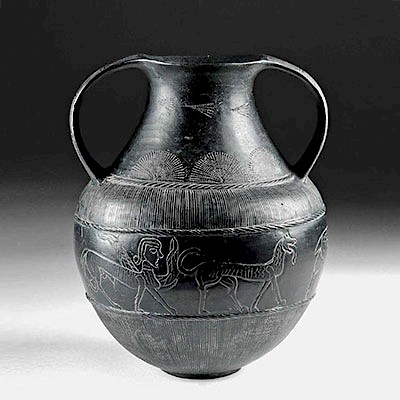Egyptian Cedar Wood Sarcophagus Mask, ex-Christie's
Lot 9
About Seller
Artemis Fine Arts
686 S Taylor Ave, Ste 106
Louisville, CO 80027
United States
Selling antiquities, ancient and ethnographic art online since 1993, Artemis Gallery specializes in Classical Antiquities (Egyptian, Greek, Roman, Near Eastern), Asian, Pre-Columbian, African / Tribal / Oceanographic art. Our extensive inventory includes pottery, stone, metal, wood, glass and textil...Read more
Estimate:
$5,000 - $8,000
Absentee vs Live bid
Two ways to bid:
- Leave a max absentee bid and the platform will bid on your behalf up to your maximum bid during the live auction.
- Bid live during the auction and your bids will be submitted real-time to the auctioneer.
Bid Increments
| Price | Bid Increment |
|---|---|
| $0 | $25 |
| $300 | $50 |
| $1,000 | $100 |
| $2,000 | $250 |
| $5,000 | $500 |
| $10,000 | $1,000 |
| $20,000 | $2,500 |
| $50,000 | $5,000 |
| $100,000 | $10,000 |
| $200,000 | $20,000 |
About Auction
By Artemis Fine Arts
Mar 21, 2019
Set Reminder
2019-03-21 10:00:00
2019-03-21 10:00:00
America/New_York
Bidsquare
Bidsquare : Fine Ancient | Asian | Ethnographic Art
https://www.bidsquare.com/auctions/artemis-gallery/fine-ancient-asian-ethnographic-art-3967
Featuring classical antiquities, ancient and ethnographic art from cultures encompassing the globe, plus fine art. Egyptian, Greek, Roman, Etruscan, Near Eastern, Asian, Pre-Columbian, Native American, African / Tribal, Oceanic, Spanish Colonial, Russian, Fine Art, so much more! Artemis Fine Arts info@artemisfinearts.com
Featuring classical antiquities, ancient and ethnographic art from cultures encompassing the globe, plus fine art. Egyptian, Greek, Roman, Etruscan, Near Eastern, Asian, Pre-Columbian, Native American, African / Tribal, Oceanic, Spanish Colonial, Russian, Fine Art, so much more! Artemis Fine Arts info@artemisfinearts.com
- Lot Description
Egypt, Late Dynastic Period, 26th Dynasty to Ptolemaic period, ca. 664 to 30 BCE. A tall and finely-carved cedar wood sarcophagus mask with strikingly naturalistic features. The mask is defined by its prominent nose with flared nostrils, raised almond-shaped eyes under curved brows, contoured cheeks, full lips with lightly-indented corners, and a narrow chin. The neck extends downwards from the back of the mask, and the smooth pate is covered by a simple rectangular headdress. The flat verso is meant to protect the body and face of the deceased, and a small cavity behind the headdress was formed to hold offerings. Residual dowel holes are scattered across the obverse and reverse sides with fragments of the original dowels in each. Though rough and exposed, this wooden mask is a beautiful example of ancient Egyptian funerary practices. Custom wooden display stand included. Size: 5.5" W x 12" H (14 cm x 30.5 cm); 14.875" H (37.8 cm) on included custom stand.
Mummy masks were principally used to protect the face of the deceased, but they could also act as a substitute for the mummified head in the case of loss or damage. In addition, the ancient Egyptians believed that the "ba" (often incorrectly translated as "spirit") could leave the tomb and travel freely in the world of the living. To make sure that upon returning it would recognize the mummy, whose face was hidden by layers of bandages, the mask functioned as a portrait. Nevertheless, most masks had idealized features and were rarely particularized portraits.
Interestingly, cedar wood was not native to Egypt. Egypt did not have verdant forests filled with tall trees, and unfortunately most of its native lumber was of relatively poor quality. So they relied on importing to acquire hardwoods - ebony from Africa as well as cedar and pine from Lebanon. One fabulous obelisk inscription by Thutmose III attests to the luxury of hardwoods. It reads as follows, "They brought to me the choicest products…consisting of cedar, juniper and of meru wood…all the good sweet woods of God's Land." The rarity of cedar meant that masks like this one were reserved for those who could afford them.
For a stylistically-similar example, please see the Smithsonian National Museum of Natural History, USNM catalog number A553186: https://artsandculture.google.com/asset/-/DgEWydQp4nyZbQ?childassetid=GwHec6DnkhEqvg
Provenance: private Florida, USA collection; ex-Christie's, London, South Kensington Antiquities auction (sale 9244, November 7, 2001, lot 527)
All items legal to buy/sell under U.S. Statute covering cultural patrimony Code 2600, CHAPTER 14, and are guaranteed to be as described or your money back.
A Certificate of Authenticity will accompany all winning bids.
We ship worldwide and handle all shipping in-house for your convenience.
#140357Small losses to obverse and reverse sides. Minor chips to facial features, verso, and peripheries, with softening to some finer details, and several stable hairline fissures. Light earthen deposits and light patina throughout.Condition
- Shipping Info
-
All shipping is handled in-house for your convenience. Your invoice from Artemis Gallery will include shipping calculation instructions. If in doubt, please inquire BEFORE bidding for estimated shipping costs for individual items.
-
- Buyer's Premium



 EUR
EUR CAD
CAD AUD
AUD GBP
GBP MXN
MXN HKD
HKD CNY
CNY MYR
MYR SEK
SEK SGD
SGD CHF
CHF THB
THB














